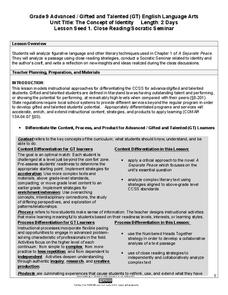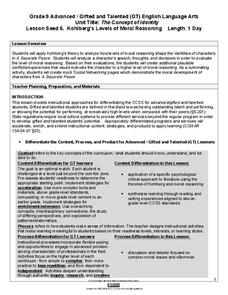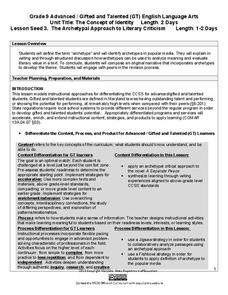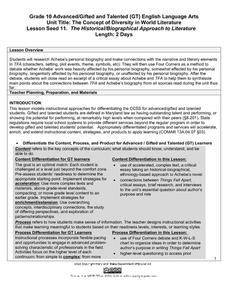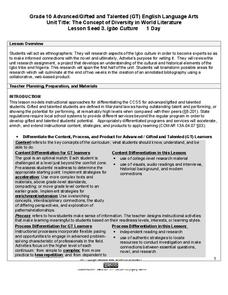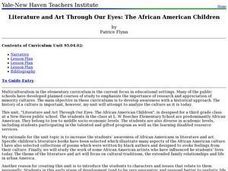Curated OER
Balance of Power
Students explore the impact of the Federal Reserve Bank. In this central bank lesson, students read specific selections out of their textbooks about the history of the bank and its role in the U.S economy. Students then select 1 of 7...
Curated OER
Socratic Seminar on Martin Luther King, Jr.’s Letter From Birmingham Jail
Key in the struggle to gain the rights of democratic citizenship was the April 1963 arrest of Dr. Martin Luther King, Jr. for civil disobedience. To deepen their knowledge and understanding of events during the civil rights movement,...
Maryland Department of Education
The Concept of Identity Lesson 1: Close Reading/Socratic Seminar
John Knowles' A Separate Peace provides readers with an opportunity to develop their close reading and analytical skills as they look for what Knowles feels are the factors that shape our identity.
Maryland Department of Education
The Concept of Identity Lesson 2: The Historical/Biographical Approach
"How does our environment shape our identity?" After researching biographical information about John Knowles and considering how these experiences are reflected in A Separate Peace, class members consider the strengths and weaknesses of...
Maryland Department of Education
The Concept of Identity Lesson 5: Motivation - Maslow's Hierarchy of Needs
Maslow's Hierarchy of Needs provides the lens class members use to analyze and evaluate the motivations of the characters in Sylvia Plath's "Initiation" and scenes from Mean Girls. Readers then select a character from A...
Maryland Department of Education
The Concept of Identity Lesson 6: Kohlberg's Levels of Moral Reasoning
How does our moral reasoning shape our identity? After a study of Kohlberg's Levels of Moral Reasoning, readers use Kohlberg's theories to analyze the speech, thoughts, and decisions of a character in A Separate Peace. They then...
Maryland Department of Education
The Concept of Identity Lesson 7: Logical Fallacies
What are the effects of competition in an academic environment? The competition between the main characters in A Separate Peace motivates a series of activities that asks readers to take a stance on competition, and then to develop a...
Maryland Department of Education
The Concept of Identity Lesson 8: Propaganda in Visual Media
Visual and print propaganda are featured in a lesson that asks readers of A Separate Peace to examine the techniques used in propaganda from World War I, World War II, presidential elections, and in the novel.
Maryland Department of Education
The Concept of Identity Lesson 3: The Archetypal Approach to Literary Criticism
As class members continue their study of approaches to literary criticism, readers examine the symbolism and archetypal patterns in John Knowles' A Separate Peace, and how these parallels are used to develop a theme...
Maryland Department of Education
The Concept of Identity Lesson 4: The Psychological Approach
Readers apply Sigmund Freud's theories of the unconscious mind and the psychological approach to literary criticism to analyze and evaluate the relationship between two characters in A Separate Peace.
Maryland Department of Education
The Concept of Diversity in World Literature Lesson 12: Author's Purpose - Yeats and Achebe
Is there such a thing as fate/luck? Can one fight destiny? As part of their study of Chinua Achebe's purpose in writing Things Fall Apart, class members answer these questions from Achebe's point of view and then from William...
Maryland Department of Education
The Concept of Diversity in World Literature Lesson 13: Unit Culmination - Symposium
To conclude a unit on the concept of diversity in world literature, class members conduct a symposium on "African Literature in Global Perspectives." In order to earn a spot on the panel, individuals craft an original thesis that...
Maryland Department of Education
The Concept of Diversity in World Literature Lesson 10: Author's Purpose Seminar
Why did Chinua Achebe write "An Image of Africa: Racism in Conrad's Heart of Darkness" in response to Conrad's novel? As part of a study of Things Fall Apart, class members conduct a socratic seminar focused on Achebe's purpose and...
Maryland Department of Education
The Concept of Diversity in World Literature Lesson 11: The Historical/Biographical Approach to Literature
How affected is Thinks Fall Apart by Chinua Achebe's personal biography? Using a four corners strategy, and evidence from their readings, class members debate the degree of biographical influence in Achebe's novel.
Maryland Department of Education
The Concept of Diversity in World Literature Lesson 9: Debating Imperialism
To gain an understanding of Imperialism, class members read Rudyard Kipling's poem, "The White Man's Burden" and Mark Twain's essay, "To the Person Sitting in Darkness." Groups compare these perceptions of non-white cultures with the...
Maryland Department of Education
The Concept of Diversity in World Literature Lesson 7: Cultural Commentary
As part of their study of Things Fall Apart, class groups develop a multimedia presentation in response to the question, "In what ways does Achebe use literature as a means to express and comment on culture and history?"
Maryland Department of Education
The Concept of Diversity in World Literature Lesson 8: Nonfiction Close Reading
As part of their study of Things Fall Apart, class members conduct a close reading of a section of Chinua Achebe's essay, "An Image of Africa: Racism in Conrad's Heart of Darkness." Jigsaw groups then compare the voice in the essay...
Maryland Department of Education
The Concept of Diversity in World Literature Lesson 1: Unit Introduction
To launch a unit study of the concept of diversity in World Literature, class members compare Chinua Achebe's essay, "An Image of Africa: Racism in Conrad's Heart of Darkness" and Richard Rodriguez's essay, "The Chinese in All of...
Maryland Department of Education
The Concept of Diversity in World Literature Lesson 3: Igbo Culture
What cultural concepts must readers understand in order to connect to Things Fall Apart? As part of their study of Chinua Achebe’s novel, class members research Nigeria and the Igbo culture to create a collaborative, web-based,...
Maryland Department of Education
The Concept of Diversity in World Literature Lesson 4: Proverbs
"Eneke the bird says since men have learnt to shoot without missing, he has learnt to fly without perching." As part of their study of Things Fall Apart, class members read Paul Hernadi and Francis Steen's essay, "The Tropical Landscapes...
Civil War Trust
Civil War Play
Raise the curtain to a class play that depicts the Civil War through both factual information and literary devices. The performance showcases the Battle of Antietam (Battle of Sharpsburg) and brings attention to women's roles,...
College Board
AP® Computer Science A: Elevens Lab Student Guide
Looking for a project to use in an AP® Computer Science class? Engage learners with a simple solitaire game called Elevens. Through these activities, learners break down the task and write the code for a game. Sign in to your College...
Curated OER
Literature and Art Through Our Eyes: African-American Artists
Examine the contributions of African-Americans in the worlds of art and literature. Over the course of a few days, young scholars will read and analyze a poem, a short story, and a piece of art. They complete a range of...
Curated OER
Writing and Autobiography
Are you working on an autobiographical or narrative writing unit? Bring this lesson plan to your class, as it takes young writers through the process of drafting and sequencing an autobiography. After observing and demonstrating steps of...
Other popular searches
- Gifted and Talented Math
- Gifted and Talented Education
- Gifted and Talented Lessons
- Gifted and Talented Reading
- Gifted and Talented Science
- Gifted and Talented Art
- Gifted and Talented Writing
- Gifted and Talented Students
- Gifted and Talented Music
- Talented and Gifted
- Gifted and Talented Projects
- Gifted and Talented Esl




